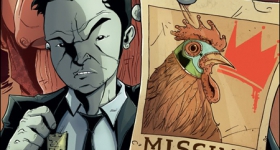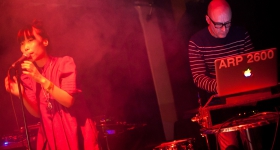On April 27, Salman Rushdie tweeted, “The award will be given. PEN is holding firm. Just 6 pussies. Six Authors in Search of a bit of Character.”
He was referring to the Freedom of Expression Courage Award that PEN was bestowing on the magazine Charlie Hebdo at PEN’s gala on May 5. And the six authors he chose, in an extravagantly misogynistic move, to call ‘”pussies”? They were Peter Carey, Michael Ondaatje, Francine Prose, Teju Cole, Rachel Kushner and Taiye Selasi. They had withdrawn as gala table hosts for PEN in protest of the award being given to Charlie Hebdo.
198 others joined these initial six writers and signed a letter to PEN to voice their objection to the award, stating that “by bestowing the Toni and James C. Goodale Freedom of Expression Courage Award on Charlie Hebdo, PEN is not simply conveying support for freedom of expression, but also valorizing selectively offensive material: material that intensifies the anti-Islamic, anti-Maghreb, anti-Arab sentiments already prevalent in the Western world.”
When the protest became public, the Twitterverse exploded in a furious debate. Some Tweeple questioned PEN’s decision to award Charlie Hebdo when some of its cartoons were racist and Islamophobic, while others debated whether the cartoons were indeed racist. (Yes, really!) Others still disagreed with the protestors, siding to some degree with Rushdie’s assessment.
In many respects, it looked like a classic argument between proponents of free speech and those advocating restraint or reflection when free speech denigrates already oppressed groups. But this time, the people in each camp were… writers. Writers who exercise their right to freedom of speech by writing it, reading it, and in this case, by protesting against it being honored.
Who expects a group of writers to agree on anything? Yet, much of the online mud slinging, including Rushdie’s infamous quote, seemed geared towards regulating discourse, convincing ‘the ‘other side’ to concur with an opposing point of view. But playing the zero sum game of “my view is better than yours” is where the loss of freedom begins. While freedom of expression is a fundamental aspect of an open society, so is the freedom and the space to dissent, to debate, to disagree.
So why were some writers (and others) trying to convince one another of the validity of their point of view?
Because, in fact, the PEN controversy isn’t only about freedom of speech; it’s about power.
PEN’s choice to honor Charlie Hebdo with an award, in effect, bestowed approval. PEN has been clear that the award to Charlie Hebdo is for its courage in exercising the right freedom of speech, not for the contents that its exercise produced. It’s an important distinction, but it evades the point that the award is a signifier of power. When PEN as an influential, global (but rooted in the US), membership-based organization gives an award to a French magazine that used racist and anti-Islamic content, it does three important things: first, it upholds freedom of expression without consideration of global power, including historical imbalances of power, wrought by colonization as well as contemporary expressions of power, such as the position and perception of Muslims in the world today; second, it replicates the old hierarchies of the West at the center and the rest of the world at the periphery; and finally, it speaks on behalf of the many who fall under its membership, and who in fact, may not subscribe to either PEN’s views or to global structures of power.
For instance, do writers of color; do Asian American writers; do Muslim writers; do Middle-Eastern writers; do writers working in oppressive regimes; do writers who are censored on the basis of race, gender, sexuality, or for critiquing the state, agree that Charlie Hebdo is a voice of freedom of expression that needs to be honored?
Stating these categories assumes that writers within these groups all think the same, which is ludicrous. (And impossible). But, reading through all the discussions -- the letters back and forth (which The Intercept has neatly compiled here), the comments, the shouts and the snark, it becomes p ainfully obvious that satire is perceived as the realm of only the free world -- Europe and the United States. Of all the vast quantity of text on the PEN award to Charlie Hebdo award, none discussed satire within a non-western context? What about satire -- including satire that defames religions -- that thrives in China, Egypt, India, South Africa, and oh, the rest of the world? Certainly none of these satirists experienced the fate of Charlie Hebdo, and for courage, perhaps none of them deserves an award, but omission of their very existence replicates an old ‘blind eye’ -- of the West towards non-Western nations, and writers.
Reading through the names of the 204 writers protesting the award, it seems that they are a heterogeneous bunch, united not by race or ethnicity or any form of identity but by a desire to interrogate, to challenge, and to disrupt the status quo of power dynamics within the literary world as a microcosm of the world at large.
This challenge to the status quo is why the PEN award, and the discourse around it, becomes not only a symbol of freedom of expression, but also one of a shift in power, a sign of a new world on her way.
Bix Gabriel is a fiction writer, who currently makes her home -- after 15 years in Brooklyn, NY, and many more in Hyderabad, India -- in Bloomington, IN, where she is enrolled in Indiana University’s MFA program. When not writing, she can be found revising her writing, reading reams, including for The Offing magazine, perusing recipes for dishes she has no plans of making, and drinking tea









Comments